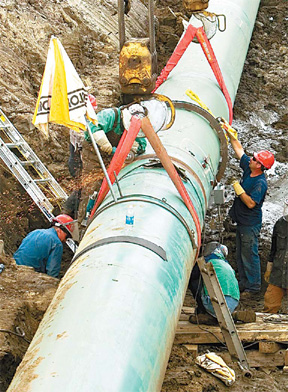PetroChina Co, the country's largest oil and gas producer, has agreed to pay C$1.9 billion (US$1.7 billion) for a stake in two oil sands projects in Canada to tap the rich deposits in the country.
Beijing-based PetroChina has signed initial agreements with Athabasca Oil Sands Corp (AOSC) to take a 60 percent stake in the Canadian company's MacKay River and Dover oil sands projects. The projects contain approximately 5 billion barrels of bitumen, AOSC said in a statement late Monday.
 |
|
Pipeline construction in Canada on a line running to the oil sands near Fort McMurray. PetroChina Co is taking a stake in two projects there. [CFP] |
Analysts said the deal, which is China's largest investment in Canada's oil sands, is in line with its need to diversify energy supplies to enhance energy security.
"Oil sands projects are very capital-intensive long-term investments and difficult to fully finance in the traditional equity market," said Bill Gallacher, chairman, AOSC.
"AOSC therefore decided to look for joint venture partners, and these strategic joint venture arrangements with PetroChina, one of the world's largest energy companies, can ensure that the MacKay River and Dover projects will be developed in a timely manner," said Gallacher.
A PetroChina spokesman yesterday made no comment on the deal.
Under the agreement PetroChina's international arm will also provide some financing for AOSC, which controls about 1.3 million acres of oil sands properties in the Canadian province of Alberta.
Gallacher said that AOSC recently visited several of PetroChina's oil facilities in northeastern China, where the company operates a number of heavy-oil projects using sophisticated technologies.
"Their field developments, operational methods, heavy-oil experience and research facilities are world class, and as a partner they will bring these very valuable attributes to the MacKay River and Dover projects in Alberta."
Oil sands, also known as extra heavy oil, is a type of bitumen deposit. The sands are naturally occurring mixtures of sand or clay, water and an extremely dense and viscous form of petroleum called bitumen.
Oil sands in western Canada are the second largest oil reserve in the world behind Saudi Arabia, but they were long neglected because of high extraction costs.
Analysts say world oil prices need to be above US$80 a barrel for the Canadian oil sands to be viable.
Oil is currently trading at about US$70 a barrel after hitting highs of US$147 last summer, and a low of near US$30 at the start of this year.
"As prices for conventional oil will remain high in the long run, heavy oil and alternative oil products will unavoidably become part of China's energy segment in the near future," Jia Chengzao, a veteran energy analyst told China Daily earlier.
PetroChina is the first major player to invest in the oil sands region since oil prices plunged last year.
Sinochem deal
London-listed oil explorer Gulfsands Petroleum yesterday denied a report it was in takeover talks with Chinese State-owned oil company Sinochem, which had boosted Gulfsand's shares over 10 percent, Reuters reported.
A spokesman for Gulfsands, which has a market capitalization of around US$450 million, said yesterday the company had not received a takeover approach from Sinochem, or other parties.
"The management have not had any kind of discussion with or proposal from Sinochem," the spokesman said.
Last month Sinochem agreed to buy Gulfsand's partner in a Syrian oil block, Emerald Energy, for almost US$900 million, and analysts said this had sparked takeover speculation surrounding Gulfsands.
(China Daily September 2, 2009)